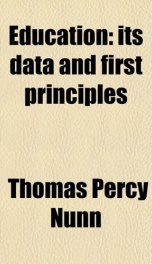education its data and first principles

Purchase of this book includes free trial access to www.million-books.com where you can read more than a million books for free. This is an OCR edition with typos. Excerpt from book: CHAPTER III THE WILL TO LIVE Horme, as we have defined the term, is the basis of the activities that differentiate the living animal from dead matter and, therefore, of what we have described as the animal's characteristic attitude of independence towards its world. The sense in which " independence " is used here needs elucidation. No creature is independent of its world in the sense that it could exist apart from it; prevented from assimilating matter from the environment in the form of food, it would soon cease to live. We may go farther, and admit that the intimacy of the relations between a living organism and its environment is, as Dr. J. S. Haldane has pointed out, one of the main differences between it and a mere machine. Matter from the environment is constantly flowing into and out of the organism, being, in Dr. Haldane's vigorous phrase, only for a while " caught up in the whirl " of its bodily structure. And the same is true of an organism's psychical activities, which could neither develop nor be sustained unless it were in constant intercourse with the world about it. For instance, a great part of a man's psychical activity is evidently dependent upon intercourse with his fellows and would perish if he were isolated. Thus it may be said that the texture of man's mind, like that of his body, consists in what is from time to time " caught up in the whirl " of its structure in perception, in thought, in all the acts involved in the common social life. Nevertheless, every animal, so long as it is alive, continues to affirm or assert itself over against the world of which, fromanother point of view, it is merely a part. Even the least " assertive " of us must recognize that this attitude belongs to every moment of our conscious lives. In every act we say to our worl...
Users who have this book
Users who want this book
What readers are saying
What do you think? Write your own comment on this book!
write a commentGenre
if you like education its data and first principles try:
Do you want to read a book that interests you? It’s EASY!
Create an account and send a request for reading to other users on the Webpage of the book!


